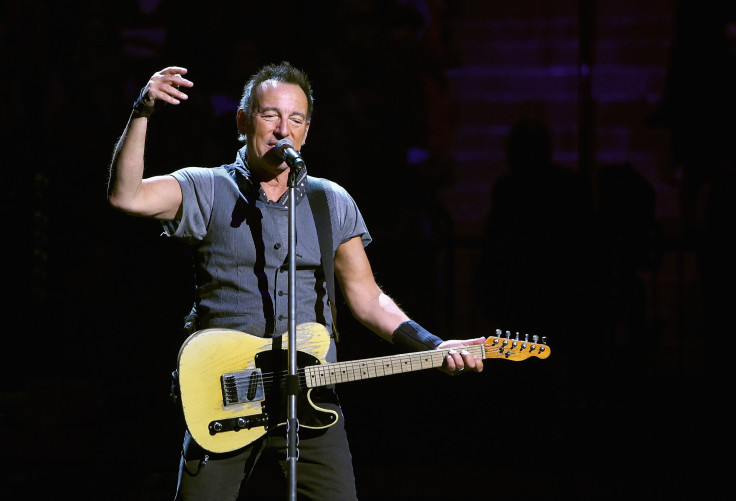In North Carolina, Lesser-Known Musical Artists Take Inspiration, Not Cues From Springsteen To Protest HB2

When a friend from Atlanta texted Virginia-based singer and songwriter Erin McKeown to see if she was canceling her shows in North Carolina following the passage of sweeping anti-LGBT legislation in the state, it was the first time the thought had crossed her mind. But for McKeown, there was never any doubt: The show must go on.
"Different artists have different options to accomplish the same goal. I think you have to do what is right for you and what makes the most sense for you," said McKeown, who felt the need to explain her decision to play after rock icon Bruce Springsteen canceled his scheduled concert in Greensboro last weekend.
Springsteen's cancelation came in protest of HB2, a so-called bathroom freedom bill that opponents say curbs the civil rights of the state’s LGBT community. While the cancelation could spur other performers to do the same, not all performers are following Springsteen’s lead. Realizing that canceling their shows wouldn’t have the same economic impact as a move by “The Boss,” many lesser-known artists are instead focused on using their shows to engage with the community and provide an opportunity to raise awareness and protest the law.
"My shows have always been a happily diverse audience in terms of queer and straight allies,” McKeown told International Business Times. “I just think it does more good to provide spaces where that kind of community can happen instead of taking them away, at least on the scale I’m operating on."
Scale is the operative word. Springsteen's jilting of the Greensboro Coliseum Complex left an estimated $100,000 in revenue on the table from parking and concessions alone, according to Andrew Brown, the public relations manager for the arena. That does not even count the revenue lost from more than 15,000 refunded tickets — likely in excess of a million dollars. It also galvanized the national discussion over HB2. Springsteen was the top trending topic on Twitter for hours after releasing a statement announcing the cancellation, drawing praise and shares from countless celebrities. But not every artist can generate that kind of buzz.
"[A boycott] is certainly something I thought about after Springsteen," said Paul DeGeorge, one half of Harry and the Potters, a parody-indie duo that ultimately decided to carry on with their show Friday in Greenville. "The other side of it is a band in our position is not going to make the same headlines. ... Us canceling has no economic impact."
Beyond economics, the widespread popularity of Springsteen across multiple demographics makes an artist of his stature uniquely positioned to change hearts and minds with a grand statement.
"There have been very few artists that occupy this weird space where people of all sides of the political spectrum and all walks of life are in the tent for an artist," said Adam Weiner, frontman of Low Cut Connie, a Philadelphia-based rock band. The group has no dates in North Carolina on its schedule right now, but Weiner said they would not be discouraged from booking gigs in the state. "Bruce is the establishment! When the establishment stands up and calls bulls--t on something, people pay attention who otherwise would not be paying attention."
Joe DeGeorge of Harry and the Potters expressed a similar sentiment, pointing out that while he and his band members planned to address the North Carolina controversy on stage, unlike Springsteen, they would largely be preaching to the choir. "Who else commands an audience in that demo [besides Springsteen]?" DeGeorge wondered.
Many more artists with North Carolina on the schedule have chosen to stay the course, including some big names. Legendary Allman Brothers Band singer Gregg Allman is going ahead with his show Wednesday.
"I know that North Carolina is a state full of good folks and loyal fans, many of whom are angry about and feel misrepresented by this action. My band and I will continue to play our show as scheduled there tomorrow, April 13, and hope that our music unites people in this challenging time," Allman wrote on Facebook.
As for lesser-known acts, Against Me!, a Florida punk band fronted by Laura Jane Grace, a transgender woman, has no plans to cancel her May 15 date at Durham’s Motorco Music Hall. Brandi Carlile, an openly gay singer-songwriter, took to Facebook to post a passionate defense of her decision to keep multiple summer dates in the state on her calendar.
For all the acts interviewed, there is one common denominator: the excitement to hear first-hand how residents in North Carolina are coping with the law and provide them with a space to come together.
"I have great relationships with the venues," said McKeown. "They are really good people and we are on the same page. They are in the trenches in the state doing the good work. I think it’s right to support them."
Weiner, though, of Low Cut Connie, pointed to a more subtle effect of playing a show in hostile territory.
"I have a song called 'Shake It Little Tina' about a macho, straight-laced guy who dresses up like Tina Turner on the weekends," said Weiner. "We play that song in Oklahoma and truck drivers bang their hands on the bar and go nuts. That is my favorite way of tapping into issues. I think that influences the culture incrementally."
North Carolina will not be the last place where artists will have to face this challenge. Laws similar to HB2, addressing which bathrooms transgender people can use, in addition to other provisions, are popping up in state legislatures across the country.
"I looked on my Twitter feed this morning and saw that Tennessee is about to vote on an even more violent and hateful bill, and Mississippi now has one," said McKeown. "For me, it is not an option to stop going to these places."
© Copyright IBTimes 2024. All rights reserved.






















